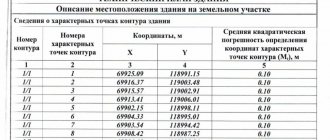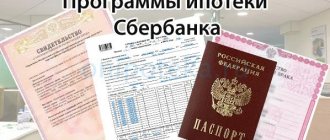Free legal consultation!
BTI is an abbreviation. Its transcript: Bureau of Technical Inventory. An organization can be either state-owned (for example, JSC Rostekhinventarizatsiya - Federal BTI) or municipal, and also have the status of an autonomous non-profit organization (autonomous non-profit organization). BTI continue to exist not only in the Russian Federation, but also in neighboring countries.
In Belarus, for example, it is called BRTI (stands for Bureau of Registration and Technical Inventory). There are also unusual abbreviations in Russia. For example, DTI (it’s quite easy to decipher - “Dagtekhinventarizatsiya”, republican BTI).
According to the Wikipedia website, in the RSFSR, control over real estate was initially within the competence of the NKVD, under which the Main Directorate of Public Utilities (GUKH) functioned since 1921. The powers of the GUKH in 1930 were assumed by the structure of the same name under the Council of People's Commissars.
What does BTI do?
The functions of the BTI are reduced, first of all, to maintaining a register of real estate and issuing technical passports for buildings (private houses, non-residential buildings, etc.) and apartments.
Without this information, it is impossible to conclude an official purchase and sale agreement or make a donation, make a transfer to the housing stock or exclude the object from it.
BTI also carries out address registration of objects, carries out geodetic work, coordinates a plan for the reconstruction of premises, collects, systematizes and provides information of a statistical and analytical nature (usually requested by authorities).
BTI services for redevelopment of premises
BTI in individual localities, together with other organizations, can offer you a full range of services for the redevelopment of residential and non-residential premises. The main ones are: development of a redevelopment project, full approval of the redevelopment, implementation of reconstruction work according to the agreed project. We would like to talk in more detail about redevelopment, the difficulties associated with it and why you will definitely need their help.
Redevelopment of apartments, offices, shops, etc. This is a whole complex of construction work carried out in individual rooms of the building while maintaining or changing the functional purpose of the redevelopment object. And may include the following reconstructive work: complete or partial replacement of partitions, incl. carriers; arrangement of openings in non-load-bearing partitions; replacement of engineering and plumbing equipment; glazing of loggias; installation of antennas.
Before proceeding with the redevelopment of residential or non-residential premises, you will first need to develop a redevelopment project, and then coordinate the redevelopment. If the redevelopment was carried out illegally, then the technical plan of the BTI of your premises will have a stamp “permission for refurbishment not presented”, which in turn prohibits any real estate transactions.
What information does the technical passport contain?
A technical passport for a building or separate premises, issued by BTI, contains the following information:
- the total area of the house or apartment, as well as information on the sizes of individual rooms (rooms, corridors, kitchen, storage room, etc.);
- estimated value of the object;
- year the facility was put into operation;
- actual address of the location of the object;
- information about the time of the last major overhaul;
- are there any communications, and what kind;
- what material the walls and ceilings of the facility are made of, as well as what was used for the interior decoration of the premises.
Material on the topic Order an extract from the Unified State Register online through Rosreestr: how to obtain information and what documents are needed
What services does BTI provide to the population?
Despite the narrowing of the terms of reference, BTI continues to work. The most popular thing, from the point of view of Russian citizens and legal entities, that the bureau continues to do is provide the requested documents. Most often people are interested in:
- confirmation of the presence/absence of a property in ownership;
- floor plans;
- plans of apartments with the indicated area;
- explications;
- physical condition of the object;
- extracts from the technical plan;
- extracts for the conversion of attics, attics, (semi) basements.
When issuing documents, the bureau uses special forms established by the Ministry of Justice.
Cost of the organization's services
Exercising the powers established by law, the bureau has the right to provide extracts and certificates as a commercial organization. There is no single all-Russian price list for services, so the differences are due to:
- regional characteristics;
- the complexity of preparing the requested document;
- deadlines set by the customer.
Why do you need a technical passport
Let's say a certain citizen intends to buy an apartment. The owners of the property describe it as magnificent: the house in which it is located is supposedly new, its walls are brick, and the price for this housing is below the market price.
This offer will interest anyone. Where can you find truly truthful information about real estate? Only in the technical passport. When studying it, it may turn out that the building is 50 percent worn out.
And it looks so “fresh” only because it was recently completely renovated. Moreover, it turns out that the walls are not brick at all, but cinder blocks. The facade is plastered, so it is not possible to determine the material of the walls by eye.
Request
There are several ways to send a request to the BTI. However, no matter how the application is submitted, it is necessary to attach to it the package of documents required in a particular case and a properly completed request.
A sample of one of the options for an application for obtaining information from the BTI can be viewed here.
Currently, the following options for sending a request for a service are possible:
- Personal appeal. Applications to the BTI are made by appointment. This procedure was introduced specifically to save applicants’ time. You can contact the authority either in person or through a legal representative.
- Lawyer's request. This type of application is subject to payment for the applicant. In this case, the documents required to receive the service are submitted by the intermediary company. The applicant will only need to pay for her services and wait for the result. It is recommended to contact only trusted organizations, so as not to end up without money and without documents.
- Application via Russian Post. In some cases, it becomes necessary to contact a branch of the authority, which is located in another city. It is not necessary to personally travel to another locality to submit documentation. You can also do this through Russian Post by sending the documentation by registered mail with a description of the attachment.
- Online. Many people are interested in the possibility of ordering a certificate online. It is worth knowing that in any case, you will not be able to receive the document in your hands by simply printing it out on a printer at home. In most cases, paper is issued upon personal application to a BTI branch or through a representative. However, certain types of certificates can still be ordered online. Such documents include a floor plan, a registration certificate for housing, a certificate of inventory value and some other papers.
Submitting an application for this documentation is currently possible through the Gosuslugi portal. To do this, you must first register on the resource, and then go to the appropriate section and fill out an application electronically. When filling out the request, you must provide a return address for communication. Representatives of the BTI will send a completed certificate to it. In this case, it is also possible to pay for the service without leaving your home.
What information and documents can I get?
Most often, citizens receive the following documents from the technical inventory bureau:
- Floor plan. A similar document contains a drawing of the premises. It is accompanied by an explanation that includes more detailed information about the parameters of the property. The preparation of this certificate takes up to 10 days.
- Extract from the technical passport for various objects. This document includes information about the date of construction of the object, wall materials, number of floors and footage. The document is also produced within 10 days. The statement is valid for a year.
- Information about the current state of the object. For this document, standard form No. 5 is provided. The certificate contains information about the date of commissioning, the availability of utility networks, as well as other parameters.
- A certificate certifying the presence or absence of property. Contains information about the real estate owned by the applicant, as well as other information, including the document number and the date of its provision. This paper is produced within a month.
- Certificate of inventory value of the immovable property. Paper will be required to participate in some transactions. It contains the price of the property taking into account depreciation. It will take 10 days to issue the certificate.
- Certificate in form No. 11. The document will be required by those owners of private houses who wish to convert the attic into a living space. The certificate is valid for 10 days.
Find out how to register the redevelopment of an apartment in the BTI. How much does a registration certificate cost at BTI? Information here.
Is it possible to get an apartment plan from the BTI using a passport? Details in this article.
Help in “utility” disputes
We still have communal apartments, with their specific disputes.
For example, a person inherited a room from his grandmother in such a quarrelsome apartment, and his new neighbors tell him that the old woman dismantled her built-in closet, after which she moved its wall into the corridor, thus taking over the common area.
They insist: bring the wall back! Do we need to rush to fulfill the demands of our neighbors? No. First you need to make a request to the BTI, which will resolve this dispute. The Bureau specialist checks whether the current layout matches the original one and issues his verdict.
In addition to technical information about the time of construction of the object, the material from which it was built, archives about the redevelopment of premises, the BTI keeps records of arrests, encumbrances and easements of houses and apartments.
Procedure and timing for production of BTI technical plan
The BTI technical plan is prepared in accordance with the general procedure established by laws and orders of the Ministry. The technical plan is signed personally by a BTI employee - a cadastral engineer.
Depending on the type of real estate (apartment, garden house, garage, parking space, real estate complex) for which a technical plan is being prepared, the BTI will require you to provide documents for registration.
After you submit the necessary documentation, the preparation of the technical plan will begin - measuring actions at the site and filling out the electronic form. Each step in the preparation of a BTI technical plan is regulated by Order No. 953 of the Ministry of Economic Development dated December 8, 2015 (You can learn in detail about the design features of the technical plan in the article: “Order No. 953 - requirements for the technical plan in 2021.”
After the BTI cadastral engineer writes the technical plan onto an electronic disk, it should be submitted for registration to Rosreestr (as a rule, this is done through a multifunctional center (local MFC) or on the government services website.
As for the timing of production of the technical plan, they are stipulated in the contract agreement concluded between the customer and BTI. As a rule, the preparation time for a technical plan is 1-2 weeks. The registration period in Rosreestr is regulated by law and is about 10 days.
How to get a technical passport
In order to obtain a technical passport from the BTI, you must complete the following steps::
- Contact the BTI itself directly with the documents available for the property.
- Write an application addressed to the head of the Bureau with a request to issue a technical passport.
- Pay the state fee.
- After payment, you will need to wait for some time: BTI employees need to study the documents and application. not be announced. If the document is necessary for subsequent redevelopment, then a BTI employee will visit the specified premises.
- Come on the appointed day and pick up the finished registration certificate. Have with you a receipt previously issued by a BTI employee regarding the acceptance of documents and an identity card (passport).
Material on the topic Public cadastral map of Rosreestr: what information it contains and how to use it online
How to obtain documents from the BTI and how much does it cost?
To receive technical documents, certificates and extracts from the BTI, you will need a passport, title documents for the property and a completed application. All services provided by BTI are paid. The price of services is set by the local municipality on the basis of acts. The validity period of documents from the BTI is also very different. More often, the validity period of a BTI extract is 1 year, a certificate of the inventory value of an object is valid for 1 month, a certificate for the re-equipment of premises is ten days.
Services at BTI are paid, but the cost in a state organization is lower than in commercial firms offering similar services.
Attention! The BTI does not register ownership of real estate; this is done by the Rosreestr Department. BTI only enters data about the current owner into its database.
Who can get a technical passport
To obtain a technical passport, you do not have to go to the Technical Inventory Bureau yourself.
The document can be received by both the property owner and the authorized representative. In the second case, the person who comes for the document must have a notarized power of attorney from the owner of the property.
This opportunity opens up broad prospects for the work of various intermediaries who are ready to take on all the hassle of obtaining a technical passport. As a rule, they know very well what package of documents to submit and how to correctly draw up an application addressed to the head of the BTI.
Scope of activity of BTI
People often ask the question: “Why BTI?”, “What is the function of BTI?”, “What does BTI do?”, “What do they do at BTI?”, “Responsibilities of BTI?”. The scope of activities of this organization is diverse. BTI specialists evaluate real estate structures, keep records of them, handle document flow and prepare certificates and technical standards. The Technical Inventory Bureau organizes accounting of unfinished construction projects, land plots, residential and non-residential premises, and all real estate objects in Russia. The organization of technical inventory is engaged in issuing documents with information that is needed for real estate transactions. For example, the BTI technical passport includes an explication and two plans - address and floor plans. This explanation will be needed when registering the redevelopment of a residential premises or when selling an apartment, for example, with a mortgage from a commercial bank.
Why does BTI evaluate real estate?
The estimated value of the object included in the technical passport almost always differs significantly from the market price.
Why then is it needed? The answer to this question is multifaceted. Firstly, it is the estimated value that guardianship authorities base on when comparing two housing units (there are cases when they try to force minor apartment owners into worse conditions in order to free up space). In this case, information from the BTI is considered objective.
Secondly, it makes it possible to assess the living conditions in the home.
Thirdly, based on it, you can generally understand whether there is an urgent need to improve the living conditions of the apartment owner or not.
Fourthly, it is from this that they proceed when seizing housing.
PROPERTIES, ORGANIZATIONAL STRUCTURE AND FUNCTIONS OF BTI
The role of Municipal Unitary Enterprise BTI in the system of state technical accounting Read more: LEGAL STATUS OF BTI OF MAGNITOGORSK AND ITS INTERACTION WITH MUNICIPAL AND OTHER AUTHORITIES
1.2 PROPERTIES, ORGANIZATIONAL STRUCTURE AND FUNCTIONS OF BTI
The term “inventory” translated from Latin means a detailed inventory of available property.
The concept of technical inventory means the identification in kind and inventory of the composition of state and municipal property.
BTI as a managed object has a number of properties. The first property is the formalized nature of the structure, i.e. it is institutionalized by the state. The second property is the purposeful nature of the activity with a focus on a specific type of activity (accounting), relationships and results. The property of goal setting makes it possible to analyze the activities of BTI, correlate goals with real objective possibilities, and coordinate them with the goals of other management subjects. The third property is self-activity, i.e. the ability to build connections and relationships with the external environment, adapt to the current situation and function autonomously. The fourth property is adaptability, a typical reaction, a stereotype of action in certain conditions. The fifth condition is the ability for self-regulation, self-management of one’s development. This is internal self-organization, its functioning. The sixth property is dependence on the external environment, i.e. objective conditions and factors of social life.
The set of BTI properties determines the extent of control actions from the state and other management entities. The stronger and more rationally these properties of BTI are manifested, the more developed it is and the control influence on it can be “softer” (of a coordination nature).
BTI as a managed object has its own organizational structure. It is determined by the socio-political nature of the state, its social and functional role, goals and content of activity.
You can give various characteristics of BTI.
Sociological, considering it as a collective of people performing the tasks assigned by society in the relevant field of activity.
Functional, revealing it as a structure that performs certain functions of the municipal unitary enterprise.
Legal, giving it the necessary competence (a set of functions and powers).
Organizational, considering its internal structure - the organization of elements and their relationships.
In our opinion, the organizational structure of the BTI should be understood as the totality of its divisions, and positions in them, the scheme of distribution of functions and powers between them, the system of relationships between these divisions and positions. The structure of the BTI depends on its place in the GTU system, the scope and content of its competence and, accordingly, its role in management.
The structure of the BTI is aimed at rationalizing and effectively managing the activities of its personnel. It meets certain requirements and is formed on the basis of certain rules. Firstly, in accordance with the mobility requirement, according to which the strength includes 100 people. Secondly, in accordance with the requirement of efficiency, according to which the functions of inventory and accounting are performed in a timely manner. Thirdly, in accordance with the requirements of efficiency, i.e. costs of carrying out activities. Fourthly, in accordance with the requirements of the controllability standard, the number of units increases every year due to objective reasons.
In this regard, it is of interest to systematize the factors (requirements) proposed by S. Kowalski:
1. factors determined by the assigned tasks: the significance of the tasks, the difficulty of the tasks, the heterogeneity of the tasks, the coordination of the tasks;
2. factors depending on the personality of the manager: the degree of independence of the manager, support staff, activities not related to management, method of management and planning;
3. factors depending on the personnel: personnel qualifications, labor integration, activities of informal groups, communication culture, staff turnover;
4. factors of a technical nature: vertical range of leadership, communications, placement in the field of activity, equipment, structure of the institution, pace of work, control, information system, information processing technology.
According to G.V. Atamanchuk, the significance of the requirements-factors lies in the fact that it allows one to calculate the rationality and effectiveness of the structure1, its compliance with the assigned competence.
The internal organizational structure of BTI has an organizational and legal form for the implementation of competence. Firstly, the management level, authorized to implement the normatively established competence. It includes the composition of positions - the head and his deputies. Secondly, a set of units that have horizontal structures (one manager for seven subordinates) and perform the necessary types of activities. Thirdly, support staff involved in maintaining the premises, maintaining information systems, etc.
The nature of the activity of BTI, its role is manifested in functions, i.e. the ways of carrying out the functions of the BTI reveal and characterize its interrelations as an integral subject of activity. Each of the functions differs in focus, content, and scope of impact. Together and in interaction with each other, they form a complex functional structure of the BTI, providing it with internal safety and dynamism and a certain role in the GTU system.
The nature of the functions of the BTI is influenced by many circumstances: the development of local government, social orientation, legal and information support. Therefore, difficulties often arise in ensuring rationality and efficiency, flexibility and adaptability of functions for the intended purposes.
In modern conditions, this problem is quite relevant, because There is a clear change of functions. Therefore, here we should proceed from taking into account two main points. Firstly, the fundamental needs of society for the state inventory of residential and non-residential funds and its state accounting. Secondly, the legal re-registration of the functions of the BTI and the assignment of certain competence to it1. In our opinion, the thesis that goals and functions must correspond to each other does not require proof. Then it becomes clear why it was created and how it works. But unfortunately, in regulatory practice this requirement is not always met. Both goals and functions are replaced by tasks that BTI must solve.2
Currently, in its activities, the Municipal Unitary Enterprise BTI of Magnitogorsk is guided by the Regulation “On state accounting of the housing stock of the Russian Federation”, approved by Decree of the Government of the Russian Federation of October 13, 1997 No. 1301. So, according to this Regulation, the main task of state accounting of the housing stock is to obtain information about the location, quantitative and qualitative composition of the technical condition, level of improvement, cost of the housing stock and changes in these indicators.
Residential buildings and specialized houses (dormitories, hotels - shelters, houses of a flexible fund, special houses for single elderly people, boarding houses for the disabled, veterans, etc.) are subject to state registration, regardless of their form of ownership. apartments, office premises and other residential premises in other buildings suitable for. residence.
The inclusion of residential buildings and residential premises in the housing stock and exclusion from the housing stock are carried out in accordance with the housing legislation of the Russian Federation.
Previously, the Decree of the Council of Ministers of the USSR “On the procedure for state accounting of the housing stock” dated 02/10/85 No. 136 was in force, which established that the housing stock does not include dachas of dacha-building cooperatives, garden houses of gardening partnerships, other buildings and premises intended for seasonal or temporary residence (regardless of the duration of residence of citizens in them. However, this provision was in conflict with Russian legislation, since Article 9 of the Federal Law of the Russian Federation provides for the right of citizens who have their own residential buildings, located on garden and dacha land plots and meeting the established requirements, to re-register them as residential buildings. If buildings located on garden and dacha land plots are recognized as residential, these residential premises can be considered the citizen’s place of permanent residence, and therefore, he has all the rights established by law for owners of residential premises, in including the right to registration at a given place of residence and the right to move other persons into this residential premises.
State accounting of the housing stock in the Russian Federation includes technical (operational) accounting, official statistical accounting and accounting.
The basis of state accounting of the housing stock is technical accounting, carried out regardless of the ownership of the housing stock according to a unified accounting system for the Russian Federation by conducting a technical inventory and registering documents on the responsibilities of copyright holders for the maintenance of residential buildings and residential premises.
Technical accounting of the housing stock is entrusted to specialized state and municipal technical inventory bodies - unitary enterprises, services, departments, centers, bureaus (hereinafter referred to as BTI), the methodological support of which is provided by a state specialized organization.
According to the Decree of the Governor of the Chelyabinsk Region “On a unified system for recording real estate objects and using the archives of the BTI of the Chelyabinsk Region” No. 322 dated July 16, 1999. The functions of state technical accounting of real estate objects of all forms of ownership (except for land plots) on the territory of the Chelyabinsk region are assigned to the state unitary enterprise “Regional Center for Technical Inventory” in the Chelyabinsk region. By his order “On the formation of accounting districts in the territory of the Chelyabinsk region” No. 24 dated December 7, 1999. 41 accounting districts were formed with a description of the boundaries of each; those who entered into agreements with the Regional TsTI for methodological and organizational services assigned the corresponding accounting districts.
Thus, the Municipal Unitary Enterprise BTI of Magnitogorsk carries out state technical accounting of real estate objects (except for land plots) within the boundaries of the administrative-territorial unit of Magnitogorsk (only three settlements: Magnitogorsk, the village of Novy Savinsky, the village of Supryak railway. passing).
With the expansion of the functions performed by BTI, the increase in the volume and complexity of the work performed, the enterprise is in need of highly qualified personnel.
Increasing the professionalism of personnel is carried out in two directions: in the recruitment of professional specialists and in the continuous improvement of the professional level of working personnel.
Professional training is a continuous process. It is not enough to acquire a profession; you need to constantly improve in it. It is known that any regularly trained specialist works 3-4 times more efficiently than an employee who does not improve his professional level. Therefore, the manager’s personnel policy is aimed at systematic training of personnel through consulting, participation in seminars, conferences, exhibitions, and obtaining certificates.
The specifics of BTI activities impose the following requirements on personnel: in the general cultural aspect - general literacy, speech culture, ability to persuade, tactfulness; in the professional aspect - competence, organization, perseverance and consistency, discipline, ability to think big, act according to instructions and find a creative solution and in personal – moral stability, honesty, independence, initiative, sociability and reliability.
To the functions of the BTI in accordance with the Decree of the Government of the Russian Federation of October 13, 1997. for No. 1301 include:
• technical inventory and certification of housing stock;
• monitoring the technical condition of residential buildings and premises;
• assessment and revaluation of residential buildings and premises, including for tax purposes;
• information and consulting services and other activities related to state technical accounting of the housing stock.
The result of a technical inventory is a technical passport compiled for each real estate object, which records the presence of the object in kind, its actual location (address), owner (holder), boundaries, composition, purpose, use, technical characteristics, cost, condition, inventory number, register and cadastral numbers, as well as a mark on the entry of information about this property into the register of real estate.
An inventory file with a corresponding number is opened for each accounting object. The inventory file is a technical passport with appendices to it, compiled on the basis of a survey, and is replenished with inventory technical documentation as surveys are carried out in order to register current changes. The inventory file is stored in the BTI archive, which is part of the unified state archive of the Russian Federation and federal property. Certificate of registration of real estate objects with state registration is carried out by issuing a copy of the technical passport for the object, with assigned inventory, cadastral numbers, certified by the seal of the BTI and the signature of the director of the BTI.
The functions of the BTI are aimed at obtaining prompt and reliable information about real estate objects. It should be borne in mind that information from state technical accounting and technical inventory of real estate is required for use in the following cases:
• preparation of state statistical and accounting reports on the housing stock;
• state registration of rights to real estate and transactions with it:
• calculation and control of the real estate tax base in the housing sector;
• commissioning of residential buildings and premises;
• determination of the technical condition and physical wear and tear of residential buildings and premises;
• registration of homeowners' associations (condominiums);
• assignment of cadastral numbers to real estate in the housing sector.
Subsequent technical accounting is carried out by conducting scheduled inventories of residential buildings and premises at least once every five years, as well as as changes in accounting indicators are identified in the process of unscheduled research.
It is necessary to distinguish between the concepts of “state accounting of housing stock” and “state registration of rights to real estate”.
Property rights and other real rights are subject to state registration in accordance with Art. 130, 131. 132 and 164 of the Civil Code of the Russian Federation. Along with the right of ownership, subjects of housing legal relations may have the following real rights: the right of economic management, the right of operational management, the right of lifelong use, mortgage, etc. Considering that residential premises belong to real estate, these real rights, according to the Civil Code of the Russian Federation, are subject to state registration in a single state register of justice institutions. Rights to residential premises arising from a rental agreement for residential premises or membership in housing (housing-construction) cooperatives are not subject to state registration.1
State registration of real estate is carried out on the basis of the Federal Law “On State Registration of Rights to Real Estate and Transactions with It” dated July 21, 1997 122-FZ. The specified Federal Law provides for the completion of the creation of a system of justice institutions for registration of rights to real estate and transactions with it by 2000, i.e. the specified registration before the creation of state registration institutions on the territory of the Chelyabinsk region, and after its creation - until the completion of the process of formation and completion of the formation of branches of the South Ural Registration Chamber in the cities of the Chelyabinsk region, by decree of the Governor of the Chelyabinsk region dated January 23, 1998 No. 44, the previous procedure was retained registration of real estate transactions, including.1
• mandatory material identification if one of the parties to the transaction is a citizen;
• registration in BTI enterprises;
• registration with the committees for land resources and land management (land plots).
Accounting, technical, appraisal and title documentation, including technical passports, registration books, copies of registered documents formed into inventory files, and other inventory documents, are stored in the BTI archive, as well as in the joint archive of the State Committee of the Russian Federation for the Housing and Communal Sector ( Gosstroy of the Russian Federation).
The archives of the BTI belong to the state archival fund of the Russian Federation and are federal property used by the constituent entities of the Russian Federation. Pursuant to the Decree of the Government of the Russian Federation
In pursuance of the Decree of the Government of the Russian Federation “On state technical accounting of the housing stock in the Russian Federation” dated October 13, 1997 No. 1301. The State Construction Committee of the Russian Federation, the Republican Department of Technical Inventory, developed the instruction “On conducting accounting of the housing stock in the Russian Federation”, approved by order of the Ministry of the Russian Federation for Land Policy, Construction and Housing and Communal Services dated 04.08.98 No. 37, agreed upon by the State Committee of the Russian Federation on Statistics and the Federal Archive Service of the Russian Federation.
From the position of a system-functional approach, it would be advisable to note such an aspect of the functional structure of BTI as a standard model (scheme) of functions. Although other cities, regions (countries) have experience in the practical development of standard models.
It shows that a correctly selected (certain) combination (set) of functions, consistent with the goal and needs of the population, greatly contributes to increasing the efficiency of BTI, makes it possible to separate stable functions from changeable ones, long-term ones from short-term ones, etc. Thus, do not preserve old functions and do not interfere with the development of new, promising ones. The main thing, in our opinion, is to ensure that the functions of the BTI in a specific historical time meet the needs and expectations of the population and society as a whole.
The role of Municipal Unitary Enterprise BTI in the system of state technical accounting Read more: LEGAL STATUS OF BTI OF MAGNITOGORSK AND ITS INTERACTION WITH MUNICIPAL AND OTHER AUTHORITIES
Information about the work “The role of municipal unitary enterprise BTI in the system of state technical accounting”
Section: Management Number of characters with spaces: 139763 Number of tables: 1 Number of images: 0
Similar works
Property management based on inventory (using the example of OGUP "OTsTI - Regional BTI")
114491
3
0
... real estate. No less important components of the real estate market infrastructure are the accounting and registration of objects. In Irkutsk, accounting and technical inventory of real estate are carried out by three organizations: MUP "BTI", Irkutsk branch of FSUE "Rostekhinventarizatsiya" and OGUP "OTsTI - Regional BTI". These organizations are engaged not only in real estate accounting, although, of course, this is their main...
Improving the process of managing municipal real estate in the city of Irkutsk
229232
40
11
... problems are associated with the training of qualified professional city property managers.(*) SECTION 2. Analysis of the current practice of municipal property management in the city of Irkutsk 2.1 Composition of municipal property in the city of Irkutsk Irkutsk, one of the most beautiful ancient cities in Eastern Siberia, began with a fort built in 1661 against the Irkut River by a detachment of Russians...
Organization of homeowners' associations as a direction of housing and communal services reform
132203
0
0
... and the housing policy of the Republic of Belarus to bring to the attention of the population information about the progress of reforms in the housing sector, including the advantages of managing the housing stock through the creation of homeowners' associations. In connection with this resolution, in the Ministry of Housing and Communal Services, responsibilities for providing methodological and organizational assistance were assigned to the department for housing reform...
Analysis of the real estate market in Irkutsk
97627
12
2
… 36.0 39.0 39.0 City average: 40.87 48.81 49.12 Fig. 2 Dynamics of the market price per square meter in new buildings in June 2007 – June 2008, thousand rubles. / m2 In general, although the growth in prices on the real estate market in 2008 compared to 2006 and 2007 slowed down, the price per square meter continues to remain at a very high level. On average, the price increase for January-May 2008 ...
Who does the BTI report to?
BTI are commercial organizations that are subordinate to their founder (authorities).
There are BTIs of federal, regional and municipal subordination. Lately you can often hear that BTI is about to be liquidated. It's safe to say that this is unlikely to ever happen. State registration of real estate is necessary - any notary, realtor, or just a potential home owner will confirm this.
Without such accounting, many mechanisms would cease to function, and the real estate market would not only become wild, it would simply disappear.
Material on the topic How to find out the year of construction of a house or building by address
For information about what a technical passport is, which is issued by BTI, see the following video:
BTI structure
The structure, which includes state-accredited BTI bodies at various levels, covers the entire country. It consists of federal and municipal organizations, commercial and using budget subsidies. The largest component of the structure is JSC Rostexinventapizatsiya. The number of staff in the branches, where lawyers, cadastral engineers, surveyors and other specialists work, is very different.
An inventory bureau, created, for example, in a large regional center as a municipal enterprise, has to actively communicate with various organizations. Requests come from:
- Management companies created in the housing and communal services sector;
- banks;
- notary offices;
- insurance companies;
- bodies of the judicial system, etc.
The number of staffing depends on the scale of activity, which is quite significant in large cities where real estate activity is high. Therefore, a department may have hundreds of employees.
Who does the BTI report to?
More precisely, talk about who the bureau works for. The federal body transfers the received data to EGRN - the All-Russian State Register of Real Estate.








